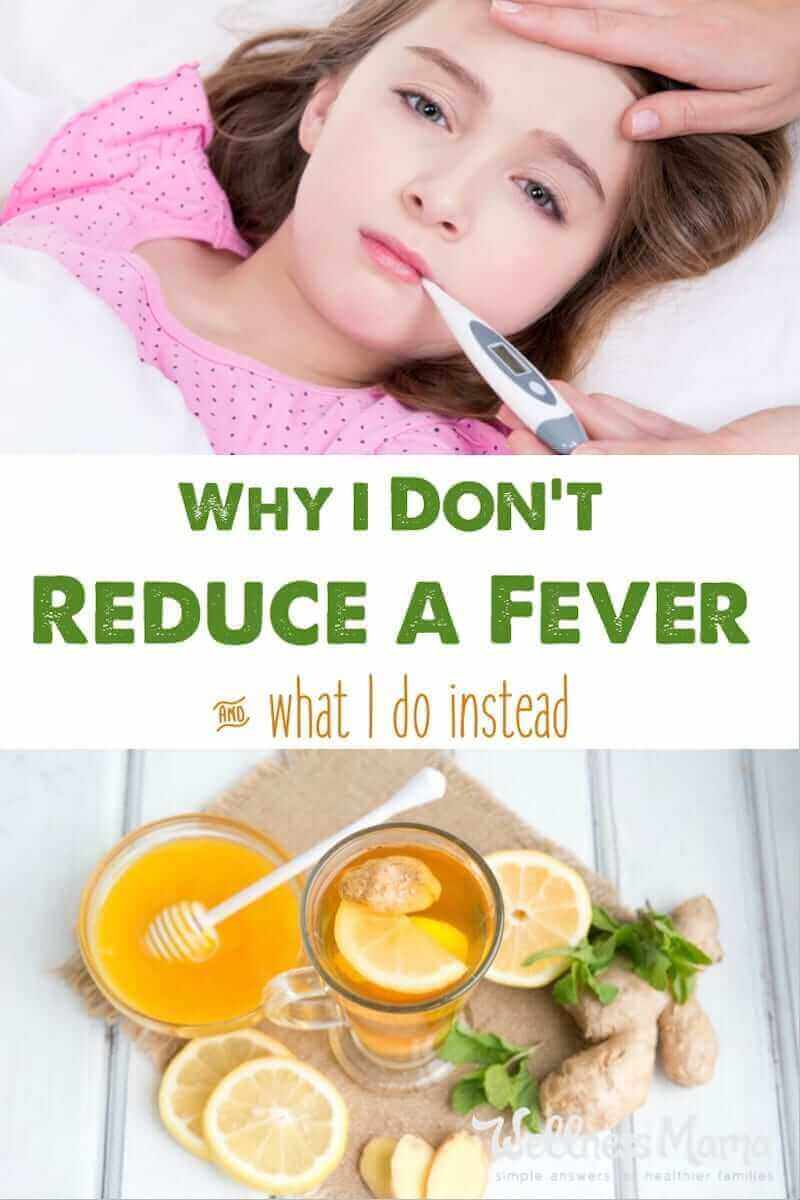It’s hard to watch when our loved ones suffer from a high temperature. Many have sent emails and asked in my Facebook group, “Should you let a fever run its course in young children?” While we can all agree on plenty of fluids, I’m not quick to use over-the-counter medications to reduce it. Some pediatrics now suggest letting the fever run its course during flu season.
I try to avoid fear-mongering and want to avoid fever phobia and misconceptions. Over the years, my home remedies have helped my family fight illness more quickly and usually prevent recurring infections. So, let’s look at what causes a fever and when to seek medical attention before looking at natural remedies for fever.
[Note: I am not a doctor, nurse, or medical professional and do not play one online. Always check with a doctor or medical professional if a medical need arises.]
What Causes a Fever?
Fever is a natural response to infection or illness that increases body temperature. A fever is a good sign as it means the body is responding and fighting infections. When the normal body temperature rises, it is part of the natural immune system response we should allow to continue in most cases.
Fever can be caused by a bacterial or viral illness, or in rare cases, by poisoning, heatstroke, environmental toxins, or a malfunctioning hypothalamus. For most of us, a simple viral infection causes fever and will fade on its own as the body heals. There are a few exceptions, but more on that later.
When Is a Fever Too High for a Child?
Despite what seems like popular belief, in most cases, a low-grade fever less than 103°F will not cause brain damage, and a fever stemming from an infection will usually not go above this unless other factors (hot environment, etc.) are present.
In many cases, those who suffer brain damage or other problems from an illness suffer from the illness itself, not the high fever. The Natural Institutes of Health and the U.S. Library of Natural Medicine states a fever less than 107°F is unlikely to cause brain damage or other problems unless accompanied by more severe symptoms. (Although I don’t like letting them go this high and have never had a child’s fever anywhere near this high).
Even fevers high enough to cause febrile seizures do not indicate a severe problem in themselves. Most febrile seizures pass quickly and don’t cause permanent damage. They aren’t a symptom of epilepsy.
I highly recommend the book How to Raise a Healthy Child In Spite of Your Doctor for a more detailed explanation about the benefits of a fever and why reducing it can be harmful.
If one of my family members has a fever less than 103-104°F that I know is not the result of poisoning, severe bacterial infection, heatstroke, or toxins, I find it best to wait it out. Nevertheless, I will monitor symptoms and use home remedies to make the person more comfortable.
This is my personal preference in this situation. While I’ve never found temperatures at this point or lower to be harmful, it is always important to do your research and talk to a medical professional if you feel the situation warrants it. In my experience, most fevers from illness hover in the 101-103°F range and are an effective part of the immune system’s response to infection, like making antibodies.
Should You Let a Fever Run Its Course?
There are several reasons it is better not to reduce a fever. Since fever is part of the body’s natural way of fighting illness or infection, reducing the fever can make the illness last longer, as it lets the virus live for a longer time.
Additionally, most OTC conventional fever treatments, called antipyretics, may do more harm than good. Acetaminophen, Motrin, Tylenol, and Advil (the medications most often given to children to reduce body temperature and fever) have side effects or even cause organ damage. Specifically, Tylenol can hurt the liver, and Advil can damage the kidneys or cause bleeding in the digestive tract, especially when given regularly.
Also, medications, like antipyretics, are foreign substances in the body, which the body must metabolize and filter. Doing so takes energy the body could be using to fight the illness.
While a fever can be uncomfortable, it is possible to comfort the ill person without reducing the fever with home remedies. The medications that reduce fever often also get rid of body aches or uncomfortable symptoms, so the two are thought to go hand in hand. While certainly, medical intervention and pyretic medicine are absolutely warranted at times, they aren’t my first line of defense for a mild fever or common cold.
When Should I Take My Child to the ER for a Fever?
In most cases, a fever is a healthy and natural immune response we should allow to run its course. There are exceptions, and in these cases, it is essential to seek medical care and make sure there is no severe problem. While I let most illnesses run their course in our home, I don’t hesitate to seek medical help immediately if the situation warrants it.
The need to talk to get medical advice quickly in cases like this is one of the many reasons why I’ve used telemedicine services where I can speak with a doctor online quickly. Of course, it doesn’t always replace going to a local doctor or even the emergency room, but it is a helpful first step in evaluating a situation.
When to Go to the Doctor
In general, these are the times I seek medical attention for a fever. Still, a parent’s intuition/research and conversation with your healthcare provider are essential for determining when a fever is severe. I seek help when:
- A child under three months has a fever over 100.4? or exhibits any serious symptoms
- A fever over 104? (this can signal a more severe infection or poisoning)
- Fever for more than two consecutive days
- Other symptoms like stiff neck, listlessness, or sensitivity to light
- The person is unable to hold down food for more than a few hours or shows any signs of dehydration
- Refusal to drink water
- Difficulty breathing, shortness of breath, or any sign of respiratory distress (Seek immediate help)
- The person has been exposed to toxins or poisons that may have caused the fever
- My mother’s intuition says there is something more serious going on, even if the child appears fine
Of course, I am a mom, not a doctor, and the above are my personal guidelines. You will want to come up with your own together with your doctor’s advice.
Natural Remedies for Fever
While I try to avoid unnecessary over-the-counter medications to treat fever, I’m also not in favor of letting an ill person suffer any more than is necessary. Fortunately, there are some easy home remedies to comfort the afflicted without drugs or medicine. For most illnesses, this is my protocol:
- Lots of fluids – for hydration and help the body flush the illness. We stick to water, my electrolyte recipe with lemon juice, and herbal teas like chamomile, peppermint, or catnip.
- Double doses of fermented cod liver oil – which seems to greatly reduce the duration of the illness and also gives the ill person important immune-boosting nutrients. We use capsules for adults and gel for kids who can’t swallow pills. I also give this daily to all family members to help boost immune function so the body can handle illness more quickly.
- Probiotics – to support immune and gut health. You’ve probably heard the saying, “All disease begins in the gut.” Probiotics, but especially during illness.
- Apple cider vinegar with the mother – for an extra boost of good bacteria.
- Elderberry syrup – to boost immune function and make the ill person more comfortable. Here’s a recipe to make your own that’s cheaper than store-bought options.
- Homemade elderberry popsicles – that I make and keep in the freezer for when anyone has a sore throat.
- Vitamin C – that’s also packed with antioxidants.
- Bone broth and homemade soups – to nourish and provide nutrients that aid in healing.
- Coconut oil – small doses mixed into food or smoothies for its antibacterial and antiviral properties.
- Hot water baths – with Epsom salts or magnesium and a sprinkle of powdered ginger to help alleviate muscle aches.
- Peppermint tea and ginger tea – also work for head and muscle aches associated with an illness.
- Natural sleep tincture or chamomile tincture to help soothe achy muscles and promote relaxing sleep if anyone is achy or having trouble resting comfortably.
- Feverfew – I don’t generally recommend it for kids without a doctor’s advice, so check with yours, but this herb has natural anti-inflammatory health benefits.
- Homeopathic remedies – like Genexa’s cold crush.
TIP: I highly recommend printing out a version of this and keeping it on hand in a cabinet with the remedies if you become ill. Even though I am the one to help a family member when they don’t feel well, I’m often not the best at remembering to do these things when I’m sick. This way, my husband can help me remember to do these things when I’m under the weather.
More From Wellness Mama
- 92: A Holistic Pediatrician Talks Ear Infections, Fevers, & Vaccines
- 137: A Holistic Rx for Keeping Your Whole Family Healthy with Dr. Madiha Saeed, MD
- 233: Decoding Childhood Allergies and Letting Kids Get Dirty With Dr. Amy Shah
- 503: Dr. Ana-Maria Temple on Fever, Cough, and Snot, Oh My
- 6 Benefits of Using Herbal Tea During a Fever
- Natural Remedies for Colds & Flu (To Help Recover Faster)
- Immune-Boosting Routine for Sending Kids Back to School
This article was medically reviewed by Dr. Jennifer Walker, an internal medicine physician. As always, this is not personal medical advice, and we recommend that you talk with your doctor or work with a doctor at SteadyMD.
What do you do when a family member is sick? Have any natural remedies for fever? Share them below!



Leave a Reply